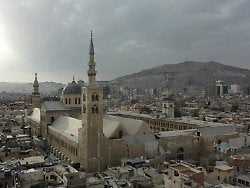Seek solution to civil war
Prominent Syrians hold secret meetings in Berlin
01/29/2022 12:46 p.m
Negotiations between the government and the opposition in Geneva are making little progress, and the civil war in Syria is continuing. Outside of the official talks in Berlin, groups of pro-government Syrians and opponents of the regime are exploring possible solutions to the conflict. They have a common goal.
They were secret talks in an unusual place: a group of influential Syrians met away from the public in a Berlin ballroom to discuss ways out of the long-standing conflict in their homeland. The participants came from hostile camps. They came both from the area under the rule of the Syrian government and from exile. Among them were members of important families and tribes as well as prominent individuals.
At this week’s meeting, they spoke without an official mandate, but with the aim of finding a compromise after almost eleven years of civil war. For two days they sat side by side in a high-ceilinged hall where people usually dance. The Syrians from the government areas took a certain risk. Since they took part in the talks without a mandate from the leadership in Damascus, they could face repression if they returned home. Most of them therefore wish to remain anonymous.
The talks are supported in the background by the Federal Government and other European countries. The initiative sees itself as a supplement to the official negotiations between the government and the opposition mediated by the UN in Geneva, which have been deadlocked for a long time.
The participants tried to build a “third way” beyond the camps, says German-Syrian Naseef Naeem, who moderated the meeting. According to him, they see themselves as representatives of a “silent majority” of Syrians who support neither the leadership nor the rebels. It’s about bridging the gap between the warring camps.
A common goal
“We all became victims in this war,” says Bassam Dschauhar, a former officer and later a supporter of the protests. “I lost part of my family, you too. We want to find common ground. Our only goal is to end the war.”
Discussions are often controversial. “We differ on many issues,” says Michel Arnuk, a doctor and one of the few from the government areas who can be named. He is a well-known personality in his homeland. “But we listen to each other and try to understand each other,” he says.
All denominations and important groups are represented: Sunnis and Christians as well as Alawites, a religious minority to which ruler Bashar al-Assad belongs and which rules in Syria. Kurds and members of other minorities also take part.
The conflict in Syria began in March 2011 with peaceful protests against which the government used violence. From this the civil war developed. With the help of their allies Russia and Iran, supporters of President Bashar al-Assad now control around two-thirds of the country again. The rest is under the control of Turkish troops, rebels or Kurds.
Every approach a success
The beginnings of the secret talks go back about five years. In 2017, after long and sometimes very contentious talks, the participants agreed on a “Code of Conduct for Syrian Coexistence” with a total of eleven principles. It says, among other things, that there are “no winners and no vanquished”. At the same time, the signatories accept accountability for violence and atrocities, but reject revenge and collective guilt.
This is significant in a conflict where camps are highly sectarian and people are often held responsible for the actions of others in their group. The principles should eventually serve as the basis for peace. In recent years, the group has met with changing members at different locations. It now operates under the name “Council of the Syrian Charter”.
The participants from the government areas and exile have come closer together, says moderator Naeem. At the first meeting, they once sat in separate rows of seats at the beginning – but this strict separation was lifted after the first coffee break. However, a few topics have been left out to this day: For the participants from the government areas, discussing the future of ruler Assad would mean crossing a red line.
The Round is also aware that given the current balance of power and the military situation, its impact is limited. But she wants to be prepared for the day the conflict ends. Or as one in the government areas puts it, “What are we saying to the world at this particular moment that hasn’t come yet?”
